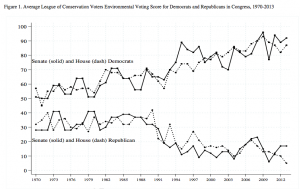This coming fall, the election will be a front and center issue—including for sustainability and environmental educators. How can we engage our students to think critically about politics and the environment, in a non-partisan fashion that is consistent with our work as educators?
A key answer is to provide historical perspective. The period from 1970-1992 saw major US national legislation on topics ranging from clean water to climate change. Since 1994, the country has passed no significant environmental laws, and the dialog on the environment has become hyper-partisan. This data from McCright et al. illustrates breakdown in the national consensus, beginning around 1991.
Polarization in environmental voting in Congress McCright et al
What was the cause of this divide, and what are the prospects for the future? To advance this conversation, the Bard Center for the Environmental Policy is hosting the Politics & Environment Education Project. The project coordinates non-partisan talks on the shift in US environmental dialog from bi-partisan consensus to partisan gridlock. What was the cause of the divide, and what are the prospects for the future?
The speakers network is made up of academic and NGO experts from across the country who have agreed to lead a discussion on the issue free of charge. Find a speaker here from your region who lives close to your campus or community group. If you would like to become a speaker, you can apply here, or email me at [email protected] to find out more.
Of course, many students will want to know how they can get involved to support their favored local, state and national candidates. Politics & Environment project speakers have agreed to make a non-partisan presentation, in which neither candidates nor their political views are disparaged. However, the talks do provide an excellent opportunity to inform students about non-partisan voter-registration activities underway on campus.
Please contact me at [email protected] to make contact with a speaker of your choice. When hosting a speaker, please speak with them directly about the specific focus of their talk to insure that it matches your educational goals.
Graphic from: McCright et al. “Political Polarization on Support for Environmental Protection in the USA, 1974-2012,” Social Science Research, 201

